The Myth of Equal Partnership in Parenting — Episode #119 With Darcy Lockman
Why is it that the burden of childcare, children and the home is so unequally dumped on women’s shoulders?
Women have fought for equality in the workplace for a long time. It’s something that is publicly talked about and advocated for and a current movement in today’s society. But what about our not-so-public lives? What about equal partnership in our lives at home?
For many women, there is nothing as maddening as coming home and realizing that there is the second shift and an incredible amount of work that disproportionately falls on your shoulders. For women across the country, this includes the domestic labor of the home, caring for children and all of the maintenance required from invisible labor to mental load. Some would call this emotional labor to the organizational and the logistical work. Well, it’s enough to drive people crazy, or to divorce.
The hardest part is that once children enter the picture, people who believe that they are in equal partnerships often find that women are the ones that take on the burden of domestic work. Why is this happening? Why isn’t it budging and why is it so enraging?
“I was surprised at how much of it just kind of defaulted to me without any discussion or conscious awareness. I saw the women around me, also full-time working women, living in the same way.” — Darcy Lockman
Today we get to have Darcy Lockman on the show to talk about exactly this. Darcy is a former journalist turned clinical psychologist and the author of a book called All The Rage: Men, Women and the Myth of Equal Partnership. Her writing has appeared in the New York Times, Psychology Today and Rolling Stone, among others. She lives with her husband and children in Queens. She joins us to talk about where the breakdown in equal partnership is most apparent, and why parenting tends to throw a wrench in most couples’ plans for equality. Plus, we’ll talk about what we can do about it. Take a listen:
Listen to The Startup Parent Podcast on Apple ★ Spotify ★ Overcast ★ Castbox or wherever you listen to podcasts. Find another podcast player or the RSS feed here.
The Myth of Equal Partnership in Parenting— Darcy Lockman
The Startup Parent Podcast — Episode #119
CONVERSATION HIGHLIGHTS:
In this episode we talk about:
- How Darcy and her husband entered both their marriage and parenting assuming that all household duties would be shared, but how Darcy nonetheless found herself managing most of her daughter’s needs herself.
- The role resentment plays in modern parenting as couples enter parenthood assuming parity and find that culturally we’ve never gotten above men carrying 35% of the childcare load.
- Why Darcy decided to utilize her background in journalism and psychology to investigate her frustration with how differently her husband and she lived in their parenting roles.
- What Darcy’s goal for this book is: to draw attention to and move the needle on the amount of unpaid labor mothers do, because, as she notes, it’s not without great cost to women’s well-being, potential career success, and earning potential.
- How cultural beliefs undermine potential parental parity from pregnancy with the belief that mother’s have an innate instinct for parenting. Meanwhile, the truth is that fathers and mothers undergo the same hormonal changes during pregnancy and have the same starting aptitude for parenting.
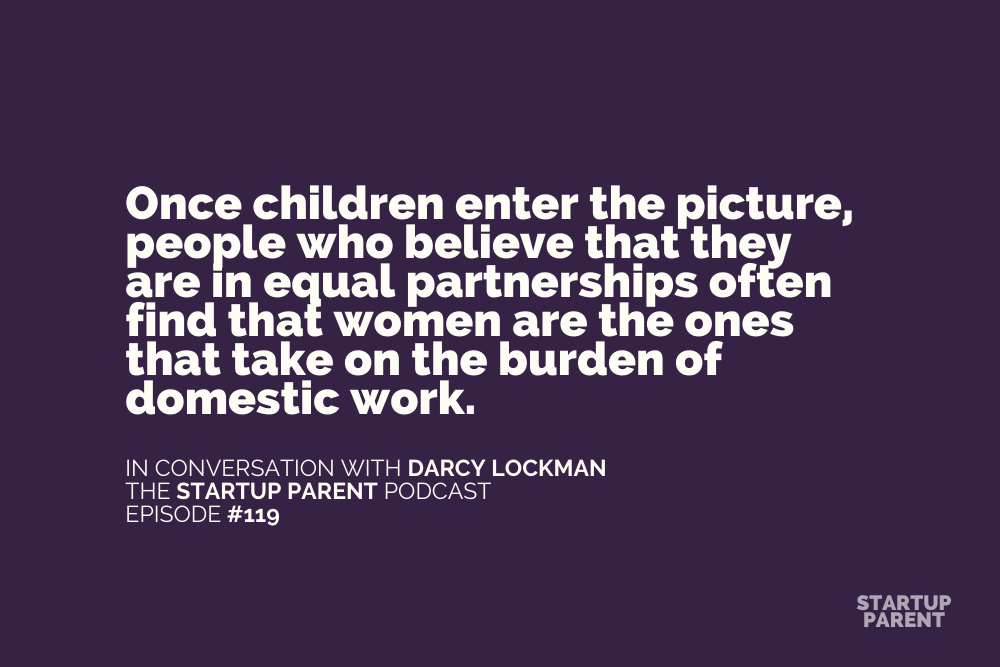
QUOTES FROM THE EPISODE
Snippets and excerpts from the conversation:
- “I was surprised at how much of it just kind of defaulted to me without any discussion or conscious awareness. I saw the women around me, also full-time working women, living in the same way.”
- “It was so hard to watch us living so differently, my husband and I, in our parenting roles. I was really resentful. I wanted to figure out why.”
- “Two-career couples have the assumption going into [having a family], ‘Of course this is equal co-parenting. It’s 2019. What else would we do?’ But it so rarely plays out that way.”
- “There’s this story that has been told in the last couple of decades about the so-called ‘modern involved father.’ He does school drop off, he knows where their socks are, he’s responsive to nightmares. So there has in our culture in the last half a century been a huge shift and how involved dads are with their kids. What we have done is mistake father involvement with their children for equality and co-parenting. We equate the two in our minds.”
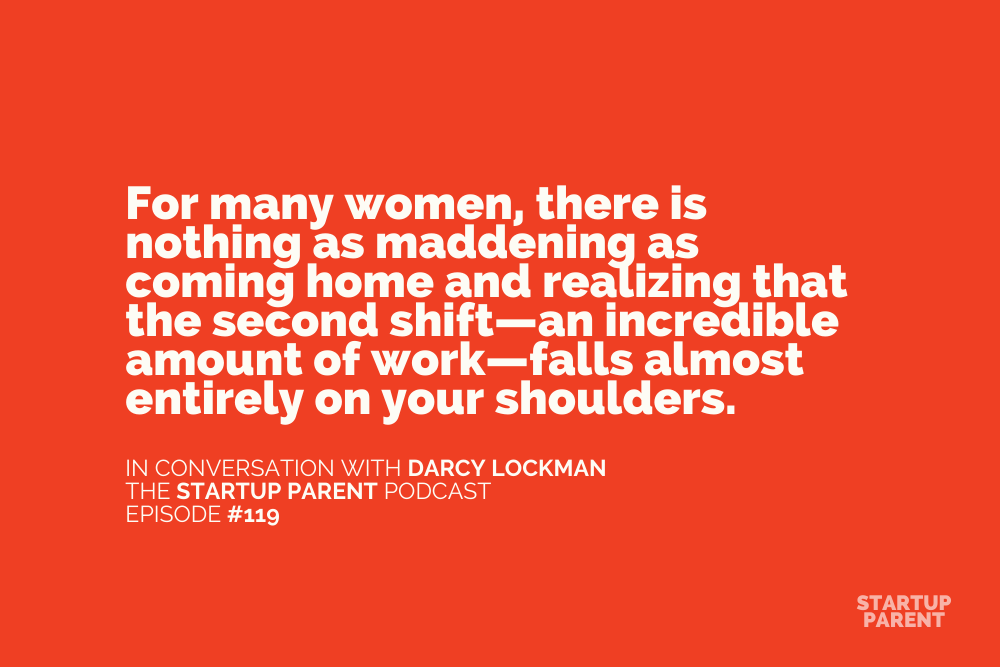
“Because we carry this myth of the ‘modern involved father,’ we don’t go into parenting knowing that actually the work of childcare never reached parity in Western homes. Women do most of the unpaid labor.“
- “In dual career couples, fathers do carry about 35% of the childcare load.”
- “A father’s participation in the care of his young child is actually the best predictor of how a woman feels about her marriage at that point. So this impacts women a lot.”
- “Women who report that the division of labor is unjust are 45% less likely to say that their marriages are very happy. There’s a ton of data on this, but it affects women much more than men, because men don’t seem to register the problem.”
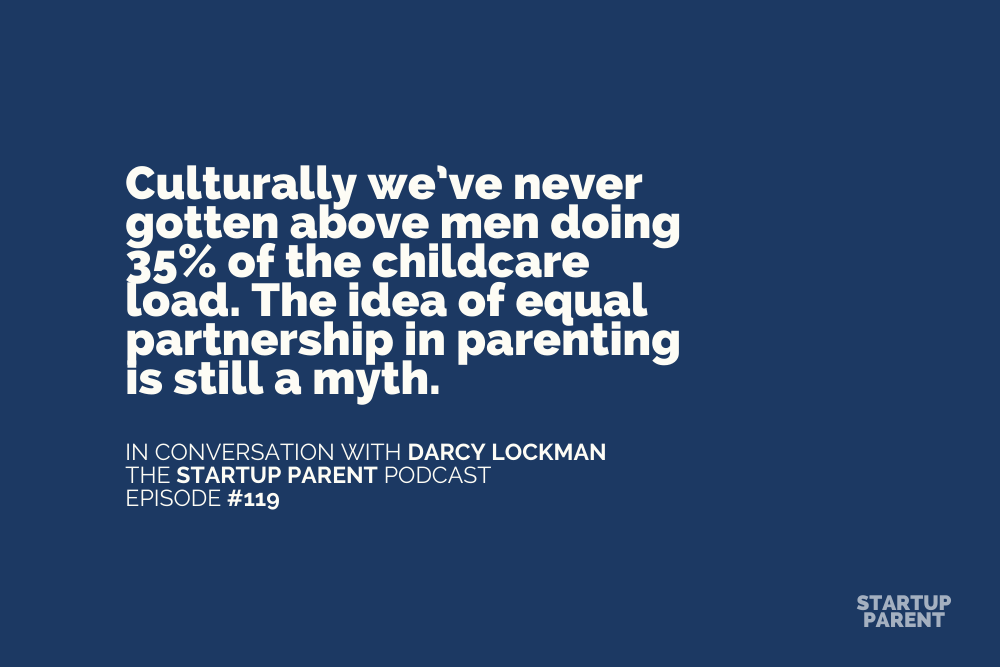
KEY IDEAS
Takeaways from this episode
📌 On the mental load that women take on, and the invisible extra work that is often dumped on females:
- “I think it’s really hard to illustrate all the mental labor that goes on. I know when children enter the home, everyone’s doing a lot more work. So I think dads feel thrown, because they feel like, ‘I’m doing so much,’ and they are doing quite a lot, because kids create a lot of work. But the women know that they’re doing more and have a hard time getting through.”
📌 Part of the challenge is that many men ARE doing a lot more work when a child enters the picture, and so they feel thrown when someone says they aren’t working hard enough.
- The problem isn’t that men aren’t doing any work—fathers are often working a lot more when a child enters the picture. The puzzle is that men take on about 35% of the additional workload—and this is the highest number based on research, it’s often lower—and women take on the other 65%. So the fathers are working, but the women take on twice as much labor at the same time, and it’s still very unequal.
- “I had one guy I was talking to at a party like a year ago and we ended up talking about what I was working on, and he had a 5-year-old daughter, and he said to me, ‘I’m listening to you and I’m thinking like, ‘I really do a lot in my daughter’s life,’ and I think we really have an equitable division of labor.’ He said, ‘But then I realized, my daughter started camp yesterday and I have no idea how that happened.’”
📌 One of the best ways to address inequity in the home starts with paternity leave. When fathers take paternity leave by themselves, it shifts the dynamic at home.
- “There’s new research actually about what happens when fathers take paternal leave by themselves. So when mom goes back to work and the dad is home, the impact of that, it pays out dividends in terms of how much more labor dads end up doing for exactly the reason you’re saying. We assume that mothers are better at this innately, and then mothers end up spending more time with babies early on. Then there’s kind of a snowball effect.”
📌 The benefits of fatherhood have the same potential upside as motherhood—men are hormonally primed to parent.
- “The potential of fatherhood is the same as motherhood. In fact, we should just call it parenthood, because there doesn’t seem to be any difference really biologically. I mean, clearly, only women can gestate and breastfeed, but other than that, men are hormonally primed to parent in the same way.”
- “One of the first studies was with newborns and parents in hospitals right after birth, and they found—they took a bunch of physiological measures, blood pressure, skin conductance, heart rate, and they found that the physiological responses of fathers to newborns was the same as the physiological responsiveness of mothers to newborns. There was no difference. The one difference they saw was that fathers were more likely to take a step back in their partner’s presence than mothers were, and that’s all about cultural beliefs.

FEATURED STARTUP PARENT
DARCY LOCKMAN
Darcy Lockman is a former journalist turned clinical psychologist. Her writing has appeared in The New York Times, Psychology Today, and Rolling Stone, among others. She lives with her husband and baby daughter in Queens.
RESOURCES & LINKS
RESOURCES MENTIONED IN THIS EPISODE
- Amy Henderson’s podcast episode on neuroscience and fatherhood
- Darcy on Twitter
- Darcy’s website
- You can purchase and review “All The Rage” on Amazon
IF YOU ENJOYED THIS EPISODE, CHECK OUT:
- Overthrowing the Patriarchy — Episode #023 With Sarah Lacy of Chairman Mom
- Race, Social Justice and Political Branding — Episode #036 With Tepsii
- Planning Ahead for Maternity Leave as an Entrepreneur — Episode #065 With Arianna Taboada
- Transitioning Back to Work After a Career Break — Episode #075 With Rita Kakati Shah
EPISODE SPONSOR & SPECIAL OFFER
One of the biggest challenges we face in business is developing focus, figuring out how to do less and gaining clarity around what’s really important. I have developed a three-step process that helps me simplify and make decisions about when to say no. Get the free guide at https://startuppregnant.com/stop.
THE STARTUP PREGNANT PODCAST & HOST
- Sign up for the Weekly Startup Parent Newsletter with insights, strategies, and new ideas for working parents.
- Find us on Facebook, Instagram and Twitter
- Want to sponsor the podcast? We’ve got great sponsors and only one shout-out per episode. We don’t shove tons of ads into our podcast. We only work with awesome.
Still here? Definitely leave us a review on iTunes. It’s really helpful for the show!
The Myth of Equal Partnership in Parenting— Darcy Lockman
The Startup Parent Podcast — Episode #119
ABOUT THE STARTUP PARENT PODCAST
If you're growing a business, leading a team, or figuring out entrepreneurship and you have kids, this podcast is for you. We go in-depth with founders and entrepreneurial parents about what it really takes to have babies, grow businesses, and get a little bit of sleep. Sign up for the newsletter to get new episodes in your inbox. And leave us a review on iTunes.
Listen to The Startup Parent Podcast on Apple ★ Spotify ★ Overcast ★ Stitcher ★ Castbox or wherever you listen to podcasts. Find another podcast player or the RSS feed here.
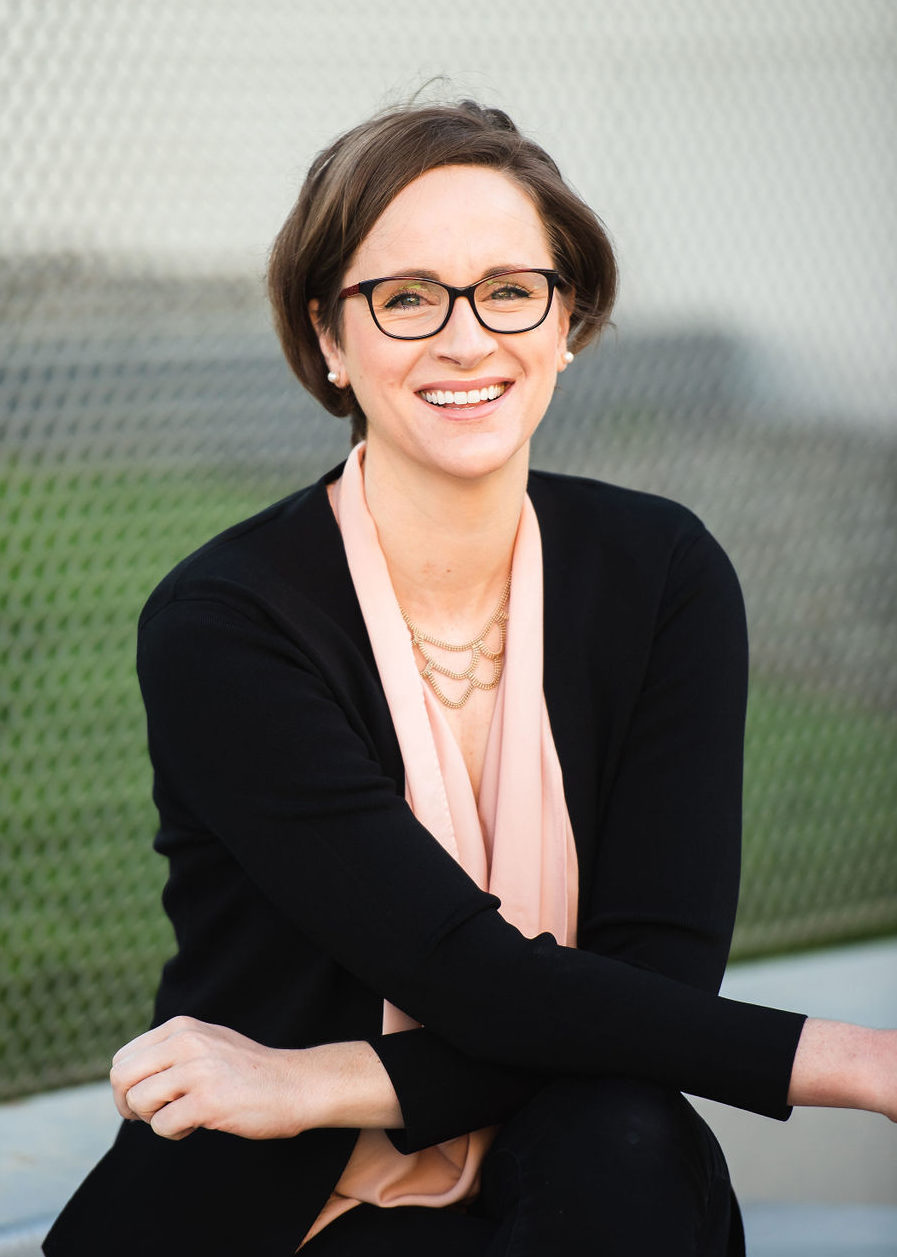
Sarah K Peck
Founder, Startup Parent
Sarah Peck is a writer, startup advisor, and yoga teacher based in New York City. She’s the founder and executive director of Startup Parent, a media company documenting the stories of women’s leadership across work and family. She hosts the weekly Startup Parent Podcast and Let's Talk, her second podcast. Previously, she worked at Y Combinator backed One Month, Inc, a company that teaches people to code in 30 days, and before that she was a writing and communications consultant.
She’s a 20-time All-American swimmer who successfully swam the Escape from Alcatraz nine separate times, once wearing only a swim cap and goggles to raise $33k for charity: water. She’s written for more than 75 different web publications and and has delivered speeches and workshops at Penn, UVA, Berkeley, Harvard, Craft & Commerce, WDS, and more.
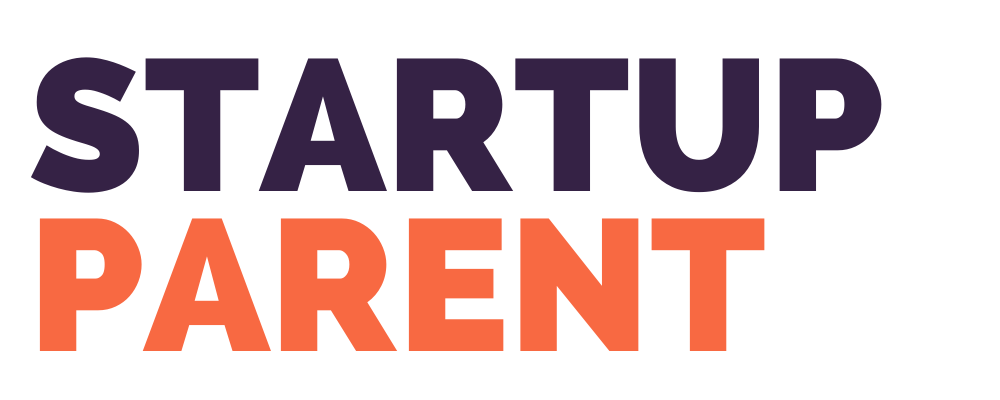
Trackbacks/Pingbacks